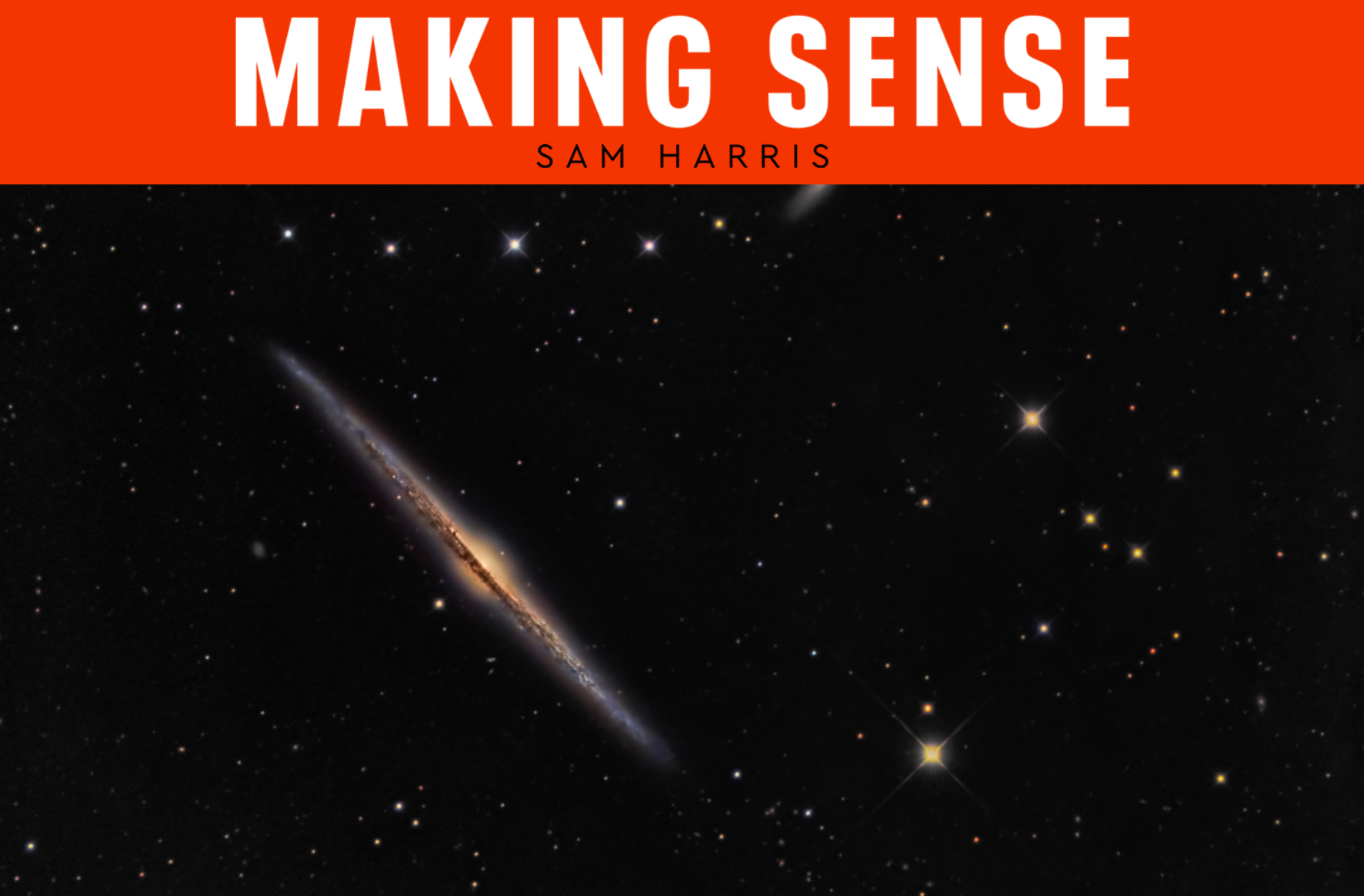
Sam Harris is a neuroscientist, philosopher and public intellectual who has authored numerous books and is the host of the Making Sense podcast.
The famed neuroscientist and prolific author has stated in three podcasts, including his own, that the government wants his help breaking UAP truth to the public
In recent weeks, the author and podcaster Sam Harris, in no fewer than three separate podcasts, has stated repeatedly and unambiguously that someone in or with connections to the U.S. government has personally reached out to him so that he can begin to wrap his brain around the fact that UFOs represent a non-human intelligence and think about how he might help prepare the public for that disclosure.
In more than thirty years as a working journalist, that’s not a sentence that I ever expected to write or even thought was within the realm of possibility, but here we are.
The clock is ticking down to June 25, when the Pentagon’s report to Congress on the UAP phenomenon is due. Ufologists and others who know that there’s a “there” there are downplaying expectations, speculating that the report will either be delayed, or — at best — we’ll get a mealy-mouthed, ambiguous small “d” Disclosure that will give rationalists comfortable room to maneuver while steering the general public back to napping in the epistemological cul-de-sac we’ve been stuck in for 70 years.
I’d be inclined to agree with the latter scenario were it not for the extraordinary statements Harris has made in the last few weeks.
Harris, for those who don’t know, is a neuroscientist, philosopher and public intellectual who, roughly speaking, is to consciousness what Neil deGrasse Tyson is to astronomy and cosmology. He is the author of seven books, the first of which — End of Faith, published in 2004 — was on the New York Times Bestseller List for 33 weeks. He launched a podcast in late 2013 entitled Waking Up, which is also the name of one of his books and his popular meditation app. Today it’s called Making Sense, and last week he released his 252nd episode. His political views have landed him in trouble with just about everyone over the last few years, depending on the topic, but above all else and if nothing else, he is unwaveringly articulate, choosing his words carefully.
I’ll take these in the order I heard them, though as I’ll explain in a moment, the conversation in the middle (with Ricky Gervais) was presumably recorded first.

Spooky Things That May Be True
On May 20, Harris appeared on the podcast of a younger scientist: Lex Fridman, an AI researcher at MIT. In a discussion lasting more than three hours that covered consciousness, free will, artificial intelligence and psychedelics, they eventually landed on UFOs. Harris brought it up in the context of an exchange about the capacity of science to generate “viral and sticky stories” (Fridman’s term) that give people meaning. He prefaced his remarks with this:
“Whatever is true ultimately should be captivating, right? What’s more captivating than whatever is real? Because … again, we’re just climbing out of the darkness in terms of our understanding of what the hell’s going on, and there’s no telling what spooky things may in fact be true.”
Then, acknowledging that he’s been “on the receiving end of recent rumors about our conversation about UFOs very likely changing in the near-term,” Harris comes out with it:
“I’ve received some private outreach, and perhaps you have, I know other people in our orbit have, people who are claiming that the government has known much more about UFOs than they have let on until now, and this conversation is actually about to become more prominent, and … whoever is left standing when the music stops, it’s not going to be a comfortable position to be in as a super rigorous scientific skeptic who’s been saying there’s no there there for the last 75 years.”
He continued:
“It sounds like the Office of Naval Intelligence and the Pentagon are very likely to say to Congress at some point in the not-too-distant future that we have evidence that there is technology flying around here that seems like it can’t possibly be of human origin, all right? Now, I don’t know what I’m going to do with that kind of disclosure … [t]hat is such a powerfully strange circumstance to be in, right? What are we going to do with that, if in fact that’s what happens? If, in fact, the considered opinions — despite the embarrassment it causes them — of the U.S. government … and all the relevant intelligence services is that this isn’t a hoax, there’s too much data to suggest it’s a hoax, there’s too much radar imagery, there’s too much satellite data, whatever data they actually have, there’s too much of it, all we can say now is something is going on and there is no way it’s the Chinese or the Russians or anyone else’s technology. That should arrest our attention collectively to a degree that nothing in our lifetime has, and one worries that we’re so jaded and confused and distracted that it’ll get much less coverage than, you know, Obama’s tan suit did a bunch of years ago. Who knows how we’ll respond to it?”
The Most Alarming or the Most Interesting Thing in the World
The date of his next statement is unclear, as I’ve not heard the new Absolutely Mental podcast he does with comedian Ricky Gervais, but I listened to an excerpt that popped up June 7 on #UFOTwitter. The limited-run, subscriber-only podcast was reportedly released May 10, which means the conversation likely took place before the one with Fridman and would help explain the “probably premature” comment.
Again, here’s Harris:
“This is probably premature to even talk about this, but I’ve had someone reach out to me and has assured me that I’m going to be on a Zoom call with, you know, former heads of the CIA and Office of Naval Research and people whose bona fide are very easy to track, and they’re concerned about the messaging around all of this to the public, and dampening down panic and conspiracy theories. But the … what is being promised here is a disclosure that is frankly, either the most alarming or the most interesting thing in the world, depending on how you take it, but it’s not a representation of the facts that will give scientific skeptics any comfort, and that’s just … we’re faced with the prospect of having to apologize to the people we’ve been laughing at for the last fifty years who have been alleging that they’ve been abducted or that cattle have been anally probed, pick your punch line.”
Harris’ penchant for clarity notwithstanding, the first sentence there leaves room for ambiguity regarding who the “I” is that scenario: Was Harris assured by the caller that the caller would be participating in a Zoom call, or that he (Harris) would?
Prepare Your Brain
Finally, in the Making Sense podcast that was released Thursday, he and Neil deGrasse Tyson talked science, astronomy, and epistemology for an hour and a half in an episode titled Are We Alone in the Universe?
Again, it was Harris who brought up UFOs:
“I got contacted by somebody who gave me a heads up with respect to all of this happening, and he more or less told me, ‘Listen, this is … when this other shoe drops, you’re going to be in the position of having to acknowledge that all the experts are on the same page, and there’s just this blanket declaration that we’re in the presence of alien technology, and we don’t know what to make of it. So prepare your brain for that, and figure out what you’re going to do.’”
One invariably encounters room for ambiguity and misunderstanding when quoting someone who is paraphrasing someone else, but the way Harris closes that sentence out makes it sound as if “alien” was the word used by the person who contacted him.
Whatever information was passed along to him, Harris’s interpretation of it is clear: It will not leave scientists and skeptics in a “comfortable position.” As a scientist, he is “faced with the prospect of having to apologize to the people we’ve been laughing at for the last fifty years.” When this “shoe drops,” he and others in his professional orbit will be needed to help the government with “messaging,” and dampen down “panic.”
Let’s be clear: If you’re in the U.S. Government and you think there’s any chance that the UAP phenomena you’re dealing with might be Chinese or Russian, there is no reason for you to call scientists who enjoy a broad public audiences and ask for help with “messaging.”
So, the takeaway: Someone fairly well-placed and knowledgeable — either currently in or closely associated with the government — has contacted one of the nation’s most well-known public intellectuals and told him to prepare his brain (and, by extension, his considerable audience) for a scenario where he must explain to the public that we’re “in the presence of alien technology.”
That should arrest our attention collectively to a degree that nothing in Harris’s 252-episode catalog of Making Sense podcasts has.
Sam, who called you? We’d like disclosure on that one, if you don’t mind.
David Bates


No comments:
Post a Comment
Note: Only a member of this blog may post a comment.